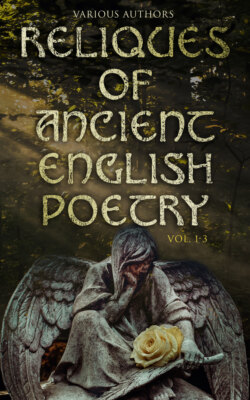Читать книгу Reliques of Ancient English Poetry (Vol. 1-3) - Various Authors - Страница 57
На сайте Литреса книга снята с продажи.
ОглавлениеV.
A SONG TO THE LUTE IN MUSICKE.
Table of Contents
This sonnet (which is ascribed to Richard Edwards,809 in the Paradise of Daintie Devises, fo. 31, b.) is by Shakespeare made the subject of some pleasant ridicule in his Romeo and Juliet, act iv. sc. 5, where he introduces Peter putting this question to the musicians.
"Peter … why 'Silver Sound?' why 'Musicke with her silver sound?' what say you, Simon Catling?
I. Mus. Marry, sir, because silver hath a sweet sound.
Pet. Pretty! what say you, Hugh Rebecke?
2. Mus. I say, silver sound, because musicians sound for silver.
Pet. Pretty too! what say you, James Sound-post.
3. Mus. Faith, I know not what to say.
Pet. … I will say for you: It is 'Musicke with her silver sound,' because musicians have no gold for sounding."
This ridicule is not so much levelled at the song itself (which for the time it was written is not inelegant) as at those forced and unnatural explanations often given by us painful editors and expositors of ancient authors.
This copy is printed from an old quarto MS. in the Cotton Library (Vesp. A. 25), intitled, "Divers things of Hen. viij's time:" with some corrections from The Paradise of Dainty Devises, 1596.
[Richard Edwards, one of the chief contributors to the Paradise of Dainty Devises, was a facile and elegant poet much appreciated by his contemporaries but unjustly neglected now. Meres in his Wits Treasury, 1598, praises him, as "one of the best for comedy," and Puttenham gives him the same commendation. Thomas Twyne and George Turberville, wrote epitaphs upon him, and the latter says in the terms of unmeasured eulogy then fashionable—
"From Plautus he the palme and learned Terence won."
Edwards was born in Somersetshire about 1523, was educated at Oxford, and, in 1561, was constituted by Queen Elizabeth a Gentleman of the Royal Chapel and Master of the Singing Boys there. He attended the Queen on her visit to Oxford in 1566, and was employed to compose a play called Palamon and Arcite, which was acted before her Majesty in Christ Church Hall.]
Where gripinge grefes the hart would wounde,
And dolefulle dumps810 the mynde oppresse, There musicke with her silver sound With spede is wont to send redresse: Of trobled mynds, in every sore,5 Swete musicke hathe a salve in store.
In joye yt maks our mirthe abounde,
In woe yt cheres our hevy sprites;
Be-strawghted811 heads relyef hath founde, By musickes pleasaunt swete delightes:10 Our senses all, what shall I say more? Are subjecte unto musicks lore.
The Gods by musicke have theire prayse;
The lyfe, the soul therein doth joye:
For, as the Romayne poet sayes,15
In seas, whom pyrats would destroy,
A dolphin saved from death most sharpe
Arion playing on his harpe.
O heavenly gyft, that rules the mynd,
Even as the sterne dothe rule the shippe!20
O musicke, whom the gods assinde
To comforte manne, whom cares would nippe!
Since thow both man and beste doest move,
What beste ys he, wyll the812 disprove?
FOOTNOTES:
809. Concerning him see Wood's Athen. Oxon. and Tanner's Biblioth. also Sir John Hawkins's Hist. of Music, &c.
810. [sorrowful gloom.]
811. [distracted.]
812. [what beast is he, will thee.]
